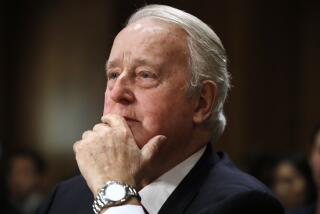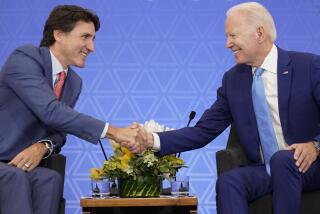Canada Pact Increases Provinces’ Power
OTTAWA — Prime Minister Brian Mulroney and all 10 provincial premiers Wednesday signed a constitutional accord that sharply alters Canada’s governing structure by strengthening the power of the provinces at the expense of the federal government.
The agreement, in the form of a series of constitutional amendments, is expected to be ratified by the federal Parliament and the provincial legislatures over the next three years.
Essentially, it gives each province equal power with the central government in several crucial areas, including national political, social and financial matters and in amending the constitution.
“It is,” said a senior government official, “an essential change from a checks-and-balances view of federalism . . . to an emphasis on consensus.”
At a time when many nations’ central governments are acquiring more power, Canada’s move in the opposite direction has been attacked by several key Canadian figures as rendering the country impotent.
A major part of this rearrangement of power was aimed at persuading the French-speaking province of Quebec to accept the nation’s constitution, which it had refused to do when the document was written in 1982 because it was not given enough special rights and a veto over federal legislation.
Quebec Premier Robert Bourassa agreed to sign the constitution this time after Mulroney and the other leaders agreed to several of his demands, including one specifically recognizing Quebec as “a distinct society.”
At the same time, Quebec was conceded several exclusive rights and privileges “to preserve” its unique status within the nation.
Wednesday’s action, coming as dawn broke after 19 1/2 hours of nonstop negotiations, climaxed a strenuous effort to find a legal formula for an agreement in principle reached on April 30.
Although the agreement is controversial and has brought former Prime Minister Pierre Elliott Trudeau out of political retirement to bitterly oppose it, there is almost no question that it will be ratified because the Parliament and legislatures are rubber stamps of ther various governments.
One of the more contentious issues, the one that forced the government leaders to work through the night, dealt with demands by several provinces that the federal government give up its power to decide the funding of many national social and welfare programs.
These premiers had demanded the right to withdraw from any such programs of which they disapproved and to receive compensation to run their own systems without any meaningful interference from Ottawa.
Critics charged that this change would make it impossible to guarantee national programs in education, health care or similar projects, an argument that was partially successful.
Under the Wednesday accord, a province that chooses to drop out of a national program can receive compensation from Ottawa only if it sets up a similar program “that is compatible with the national objectives” set up by the federal government.
However, legal experts say this wording is so vague as to be meaningless, and officials acknowledge that the courts will have to determine the exact meaning.
In other weakenings of federal power, Mulroney effectively agreed to allow the provinces to select members of the federal Senate and the Supreme Court.
Quebec was given the right to have three of the nine Supreme Court seats even though it accounts for less than 20% of Canada’s population.
In other concessions to Bourassa, Mulroney and the premiers said Quebec is exclusively entitled to “preserve and promote the distinct identity” of the province and that the federal government cannot interfere with provincial efforts to guarantee the supremacy of French over English.
This has been a very sensitive issue. Quebec has resisted all efforts to make it bilingual and in fact has restricted the use of English or, in many cases, made it illegal.
Mulroney engineered this radical departure in order to carry out a 1984 campaign promise to bring Quebec into the Constitution.
Trudeau and other critics charge that he gave up far too much to reach his goal.
More to Read
Sign up for Essential California
The most important California stories and recommendations in your inbox every morning.
You may occasionally receive promotional content from the Los Angeles Times.










